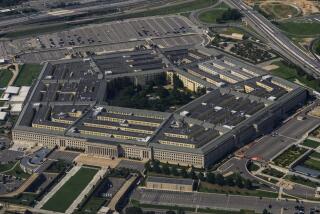Ashcroft’s Law West -- and East -- of the Pecos
- Share via
If there is one legal principle that seems to guide Atty. Gen. John Ashcroft, it is this: Possession is nine-tenths of the law.
In holding citizens and noncitizens, Ashcroft has claimed unilateral authority to dictate how and where they will be tried and, most important, executed.
In the last few weeks, he has taken this control to a new level, defying states and judges who do not conform to his demands for speedy justice.
For some officials in Maryland, Ashcroft virtually took on the role of a body snatcher in the aftermath of the arrest of the Washington sniper suspects. Though many observers thought that Maryland would have the clear claim for the first prosecutions as the state with the first and most murders in the case, the state’s historical caution in using the death penalty did not sit well with Ashcroft.
So the Justice Department simply took possession of both suspects. What followed was a prosecutorial version of EBay. For a week, all the prosecutors were dialing in their bids to Ashcroft, publicly shilling for their ability to deliver the death penalty in a jiffy. Virginia had the advantage, promising not only to ice both defendants but also to execute their Chevy Caprice to seal the deal. Ashcroft handed the two over to Virginia like kitchen appliances on layaway plan.
While giving up such prize defendants, however, Ashcroft recently made clear that no deal is final -- until execution. Consider the fate of accused Sept. 11 conspirator Zacarias Moussaoui in a Virginia federal court. Although Ashcroft had previously moved Moussaoui from Minnesota to this ultraconservative court, the judge started behaving strangely: She was actually considering defense motions. In the Ashcroft Justice Department, such due process is viewed as coddling. Ashcroft is now reported to be thinking of taking back Moussaoui for a fast military tribunal.
U.S. District Judge Leonie Brinkema is not the only judge in Virginia to earn Ashcroft’s ire. U.S. District Judge Robert G. Doumar refused to go along with Ashcroft’s unilateral actions in the case of Yaser Esam Hamdi, a U.S. citizen accused of having terrorist connections. Doumar demanded proof other than Ashcroft’s assertion that he has the power to declare any person an “enemy combatant” and thus entitled to no constitutional rights. Ashcroft refused. He reportedly now is putting Hamdi on a list for a tribunal as well.
A military tribunal is designed for quick convictions, little appeal and easy executions. It is the convenience store of junk justice: fast service, cheap products, no substantive value.
It now seems that who is and who is not subject to summary tribunal justice is up to the shifting inclinations of Ashcroft, which sometimes appear as arbitrary as his choice of breakfast meat.
For example, John Walker Lindh was captured fighting in Afghanistan after being trained by Al Qaeda. Ashcroft let him have a real trial in a real court. Hamdi, also arrested in Afghanistan, has been denied access to counsel or the courts.
Then there is Jose Padilla, a Brooklyn, N.Y., native arrested in May at Chicago’s O’Hare International Airport and accused of plotting to set off a “dirty bomb.” Ashcroft has stripped him of all rights and denied him access to courts or counsel.
Most attorneys general would resist removing cases from the Justice Department and declaring the military to have a superior judiciary. But Ashcroft has become a walking contradiction, more general than attorney. Whereas his predecessors viewed the justice system as the very thing that defines us as a nation of laws, Ashcroft views justice as merely one means to an end.
As he prepares his list for summary judgment and execution, the American justice system will be the first to be dispatched.
More to Read
Get the L.A. Times Politics newsletter
Deeply reported insights into legislation, politics and policy from Sacramento, Washington and beyond. In your inbox twice per week.
You may occasionally receive promotional content from the Los Angeles Times.










